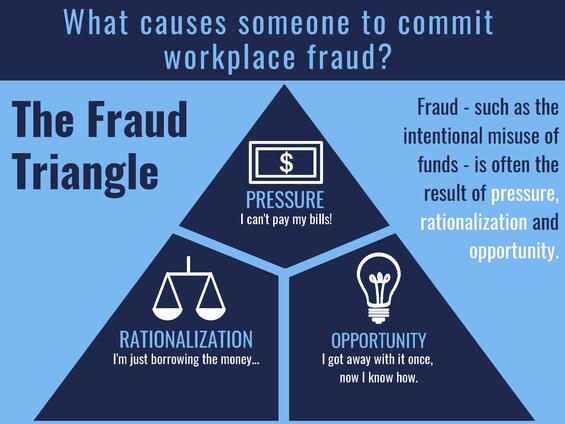Red Flags for Fraud in the Workplace
Understanding that certain behavior in the workplace can be a sign of possible fraud can help detect fraud more quickly. Public employers and employees have a duty to be on the lookout for and report red flags that could signal potential fraud. Red flags do not necessarily confirm fraud but may indicate a need for greater oversight.
Examples of employee red flags:
- Willingness to cut corners or be deceptive in business dealings
- Reluctance to share information or control over vulnerable areas
- Annoyance or defensiveness when questioned about files, decisions, or business practices
- Unwillingness to share job responsibilities or go on vacation
- Sudden changes in personal spending
- Financial pressures, including significant personal debt and credit issues
- Drug, alcohol, or gambling problems
Examples of management red flags:
- One individual or small group that dominates decisions
- Ability of one person to make major decisions without knowledge or approval of second person or group
- Use of an excessive number of bank accounts
- Missing documents (especially original versions)
- Inventory discrepancies
- Irregular or questionable transactions
- Expenses over budget
Time Fraud
Time fraud is one of the most common types of workplace fraud. It occurs when an employee or manager claim hours they did not work and receives payment for them.
Examples include:
- Taking vacation without recording leave on official agency time records
- Submitting overtime that was not worked.
- Leaving work early or arriving late but claiming to work a full shift.
The Fraud Triangle
How does an employee decide to commit an act of fraud? The fraud triangle helps explain the reasoning behind it.

Examples of Motivation
- Financial pressure, such as credit card or medical debt
- Pressure to live beyond your means
- Substance use or gambling problem
- Sudden life event: divorce, illness or job loss
Examples of Rationalization
- "I’m just borrowing the money. "
- "The jurisdiction will not miss the money."
- "I deserve this money because of the hard work I do."
- "Everyone is doing it."
Examples of Opportunity
- Weak internal control environment: Absence of internal checks and balances. A common control is referred to as segregation of duties. To ensure process integrity, the employee making a bank deposit should also not reconcile the bank statement, and the employee approving an invoice should not process its payment.
- Access to systems: An employee has unrestricted or controlled ability to access and possibly manipulate data in both paper and electronic files.
- Knowledge of how to beat the system: An employee knows of system weaknesses and loopholes, allowing them to “beat the system,” given the opportunity and motivation to do so.
- Lack of an audit trail: No record keeping system to hold employees accountable.
- Ability to override the process: An override occurs when someone uses their authority to bypass, get around, or simply not follow the rules. Overrides invalidate any system put in place. Any override should be a well-documented and an auditable exception to the rules.
- Lack of management oversight: Managers fail to monitor employees' activities or lack a system to keep them accountable.
- Poor tone at the top: Tone at the top is considered an internal control. It is the culture, environment, and tone set by management at all levels concerning expectations for accountability, transparency, and integrity. A poor tone at the top indicates an organization whose leadership does not value a strong control framework or the prevention of fraud, waste, or abuse.
Examples of OIG Fraud-related Cases
| Case and Motivation | Opportunity |
|---|---|
| A library director embezzled funds to live beyond her means. |
|
| A firm overbilled jurisdictions despite a contractual obligation. |
|
| A town collector embezzled funds in part to pay her own tax bills but also a likely motive was to live beyond her means. |
|
| A transit police officer left shifts early or did not show up for shifts that he was paid in full to work. |
|
Contact
Online
Phone
Confidential translation services are available in most languages for non-English speakers.
Address
| Last updated: | July 8, 2025 |
|---|
